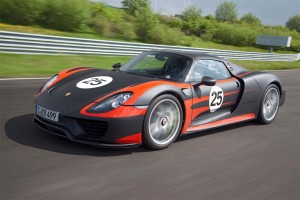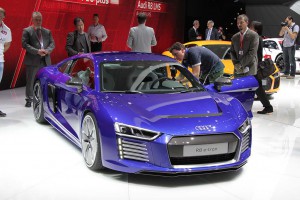
Porsche showed the potential for battery power with its 918 Spyder - but may now go pure battery-electric.
Porsche may become the latest automaker to enter the high-performance electric vehicle market – and to take on battery-carmaker Tesla Motors.
The German sports car company already has introduced several hybrid and plug-in models, but it is considering a purely battery-based option, its chief executive suggested during the company’s annual meeting.
“In the not-too-distant future, we will present a seventh model line,” said CEO Matthias Mueller, noting the goal is to have an additional product line in showrooms by 2020. “There are already promising plans,” he added, “but no board decision yet.”
Like other high-end manufacturers, Porsche faces a variety of challenges in the years ahead. On the positive side, sales are running at record levels. But that could make it even tougher to meet tough new emissions and fuel economy standards around the world. It also knows that there is a small but potentially growing subset of buyers who want to find more environmentally friendly ways to deliver performance.
Porsche, a subsidiary of Volkswagen AG, hopes to sell more than 200,000 vehicles for the first time in 2015. Itscurrent line-up includes hybrid and plug-in models, including variants of the four-door Panamera, as well as a hybrid ultracar, the $845,000 918 Spyder.
Battery power proponents note that electric drivetrains not only can provide clean efficient transportation but also offer tremendous performance capabilities.
Significantly, a growing number of flagship models – such as the McLaren P1 and Ferrari’s LaFerrari – have adopted some form of hybridization to help boost performance, an approach now used in the world’s premier motorsports series, Formula One.

The new Audi R8 e-tron shown on the maker's stage at the Geneva Motor Show. A V10 Plus is in the background.
Lamborghini last year showed off a hybrid concept that is expected to reach production in the near future. Meanwhile, Porsche’s sibling brand, Audi AG, unveiled its own pure battery-electric vehicle at the Geneva Motor Show earlier this month.
(Click Here to check out the new Audi R8 e-tron.)
Making its debut alongside a newly redesigned, gas-powered version of the R8, the e-tron tucks a T-shaped lithium-ion battery pack into the sports car’s low body, along with two electric motors. The combination not only can launch from 0 to 60 in less than four seconds, but it can deliver as much as 280 miles of range per charge, nearly triple what most of today’s electric vehicles can manage.
Barely a week after the debut of the R8 e-tron, Audi officials indicated plans to also add a pure battery-electric sport-utility vehicle which is expected to be called the Q6 e-tron. The maker indicated it would get over 300 miles of range per charge.
(For more on Audi’s electric SUV plans, Click Here.)
Extended range is seen by industry observers to be as important as performance in getting consumers to accept future battery-electric vehicles. Currently, most battery-cars are limited to around 100 miles per charge.
The big exception is Tesla, which can deliver around 300 miles per charge with the longest-range version of its Model S sedan. Meanwhile, the California start-up has also shown the performance potential of electric power with the Model S 85D version that can launch from 0 to 60 at speeds rivaling a McLaren.
(Tesla gets off to a slow and troubled start in China. Click Here for the latest.)

Like other auto makers Porsche will need to do hybrids, EVs and bicycles to try and meet the absurd Obama/EPA 54.5 mpg CAFE requirement. Both VW and Porsche have excellent EV tech so this be a no brainer. Sales will likely be to city dwellers however contrary to the unsubstantiated range claims of Tesla.
I am not an electric power Luddite and realize it will be the future.
But, pulling on to the freeway or coming out of a tight corner with the throttle floored in my Cayenne S gives such a sweet, sweet sound (only a quattroporte has a better sound).
i wonder if Porsche will include a clothesline clip for the playing card?